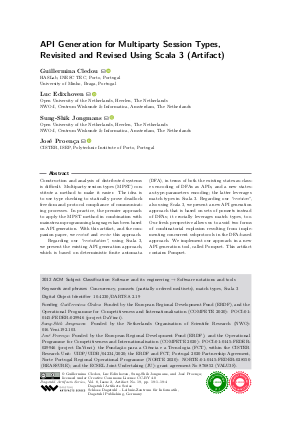API Generation for Multiparty Session Types, Revisited and Revised Using Scala 3 (Artifact)
Authors
Guillermina Cledou  ,
Luc Edixhoven
,
Luc Edixhoven  ,
Sung-Shik Jongmans
,
Sung-Shik Jongmans  ,
José Proença
,
José Proença 
-
Part of:
Issue:
Special Issue of the 36th European Conference on Object-Oriented Programming (ECOOP 2022)
Part of: Volume: DARTS, Volume 8 (ECOOP 2022)
Part of: Conference: European Conference on Object-Oriented Programming (ECOOP)
Part of: Journal: Dagstuhl Artifacts Series (DARTS) - License:
 Creative Commons Attribution 4.0 International license
Creative Commons Attribution 4.0 International license
- Publication Date: 2022-06-23
Artifact Description

PDF
DARTS.8.2.19.pdf
- Filesize: 0.55 MB
- 4 pages
Document Identifiers
Subject Classification
ACM Subject Classification
- Software and its engineering → Software notations and tools
Keywords
- Concurrency
- pomsets (partially ordered multisets)
- match types
- Scala 3
Metrics
- Access Statistics
-
Total Accesses (updated on a weekly basis)
0Document
0Metadata
Artifact
DARTS-8-2-19-artifact-557dab5a53589ecef7d64c1c13abce9d.zip
(Filesize: 6 GB)
MD5 Sum:
557dab5a53589ecef7d64c1c13abce9d
(Get MD5 Sum)
Artifact Evaluation Policy
The artifact has been evaluated as described in the ECOOP 2022 Call for Artifacts and the ACM Artifact Review and Badging Policy
Abstract
Construction and analysis of distributed systems is difficult. Multiparty session types (MPST) constitute a method to make it easier. The idea is to use type checking to statically prove deadlock freedom and protocol compliance of communicating processes. In practice, the premier approach to apply the MPST method in combination with mainstream programming languages has been based on API generation. With this artifact, and the companion paper, we revisit and revise this approach. Regarding our "revisitation", using Scala 3, we present the existing API generation approach, which is based on deterministic finite automata (DFA), in terms of both the existing states-as-classes encoding of DFAs as APIs, and a new states-as-type-parameters encoding; the latter leverages match types in Scala 3. Regarding our "revision", also using Scala 3, we present a new API generation approach that is based on sets of pomsets instead of DFAs; it crucially leverages match types, too. Our fresh perspective allows us to avoid two forms of combinatorial explosion resulting from implementing concurrent subprotocols in the DFA-based approach. We implement our approach in a new API generation tool, called Pompset. This artifact contains Pompset.
Cite As Get BibTex
Guillermina Cledou, Luc Edixhoven, Sung-Shik Jongmans, and José Proença. API Generation for Multiparty Session Types, Revisited and Revised Using Scala 3 (Artifact). In Special Issue of the 36th European Conference on Object-Oriented Programming (ECOOP 2022). Dagstuhl Artifacts Series (DARTS), Volume 8, Issue 2, pp. 19:1-19:4, Schloss Dagstuhl – Leibniz-Zentrum für Informatik (2022)
https://doi.org/10.4230/DARTS.8.2.19
BibTex
@Article{cledou_et_al:DARTS.8.2.19,
author = {Cledou, Guillermina and Edixhoven, Luc and Jongmans, Sung-Shik and Proen\c{c}a, Jos\'{e}},
title = {{API Generation for Multiparty Session Types, Revisited and Revised Using Scala 3 (Artifact)}},
pages = {19:1--19:4},
journal = {Dagstuhl Artifacts Series},
ISSN = {2509-8195},
year = {2022},
volume = {8},
number = {2},
editor = {Cledou, Guillermina and Edixhoven, Luc and Jongmans, Sung-Shik and Proen\c{c}a, Jos\'{e}},
publisher = {Schloss Dagstuhl -- Leibniz-Zentrum f{\"u}r Informatik},
address = {Dagstuhl, Germany},
URL = {https://drops.dagstuhl.de/entities/document/10.4230/DARTS.8.2.19},
URN = {urn:nbn:de:0030-drops-162171},
doi = {10.4230/DARTS.8.2.19},
annote = {Keywords: Concurrency, pomsets (partially ordered multisets), match types, Scala 3}
}
Author Details
- Open University of the Netherlands, Heerlen, The Netherlands
- NWO-I, Centrum Wiskunde & Informatica, Amsterdam, The Netherlands
- Open University of the Netherlands, Heerlen, The Netherlands
- NWO-I, Centrum Wiskunde & Informatica, Amsterdam, The Netherlands
Funding
- Cledou, Guillermina: Funded by the European Regional Development Fund (ERDF), and the Operational Programme for Competitiveness and Internationalisation (COMPETE 2020): POCI-01-0145-FEDER-029946 (project DaVinci).
- Jongmans, Sung-Shik: Funded by the Netherlands Organisation of Scientific Research (NWO): 016.Veni.192.103.
- Proença, José: Funded by the European Regional Development Fund (ERDF), and the Operational Programme for Competitiveness and Internationalisation (COMPETE 2020): POCI-01-0145-FEDER-029946 (project DaVinci); the Fundação para a Ciência e a Tecnologia (FCT), within the CISTER Research Unit: UIDP/UIDB/04234/2020; the ERDF and FCT, Portugal 2020 Partnership Agreement, Norte Portugal Regional Operational Programme (NORTE 2020): NORTE-01-0145-FEDER-028550 (REASSURE); and the ECSEL Joint Undertaking (JU): grant agreement No 876852 (VALU3S).
Related Article
- Guillermina Cledou, Luc Edixhoven, Sung-Shik Jongmans, and José Proença, "API Generation for Multiparty Session Types, Revisited and Revised Using Scala 3", in 36th European Conference on Object-Oriented Programming (ECOOP 2022), LIPIcs, Vol. 222, pp. 27:1-27:28, 2022. https://doi.org/10.4230/LIPIcs.ECOOP.2022.27
